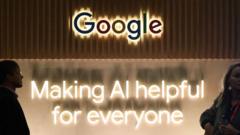Google AI search says to glue pizza and eat rocks


Google’s new artificial intelligence (AI) search feature is facing criticism for providing erratic, inaccurate answers.
Its experimental “AI Overviews” tool has told some users searching for how to make cheese stick to pizza better that they could use “non-toxic glue”.
The search engine’s AI-generated responses have also said geologists recommend humans eat one rock per day.
A Google spokesperson told the BBC they were “isolated examples”.
Some of the answers appeared to be based on Reddit comments or articles written by satirical site, The Onion.
But Google insisted the feature was generally working well.
“The examples we’ve seen are generally very uncommon queries, and aren’t representative of most people’s experiences,” it said in a statement.
“The vast majority of AI overviews provide high quality information, with links to dig deeper on the web.”
It said it had taken action where “policy violations” were identified and was using them to refine its systems.
It is not the first time the company has run into problems with its AI-powered products.
In February, it was forced to pause its chatbot Gemini which was criticised for its “woke” responses.
Gemini’s forerunner, Bard, also got off to a disastrous start.
Google began trialling AI overviews in search results for a small number of logged-in UK users in April, but launched the feature to all US users at its annual developer showcase in mid-May.
It works by using AI to provide a summary of search results, so users don’t have to scroll through a long list of websites to find the information they are seeking.
It is billed as a product that “can take the legwork out of searching” though users are warned it is experimental.
However, it is likely to be widely used – and trusted – because Google search remains the go-to search engine for many.
According to web traffic tracker, Statcounter, Google’s search engine accounts for more than 90% of the global market.
Google is far from the only tech facing a backlash over its attempts to cram more AI tools into their consumer-facing products.
The UK’s data watchdog is looking into Microsoft after it announced a feature coming to its new range of AI-focused PCs that would take continuous screenshots of their online activity.
And ChatGPT-maker OpenAI was called out by Hollywood actress Scarlett Johansson for using a voice likened to her own, saying she turned down its request to voice the popular chatbot.
